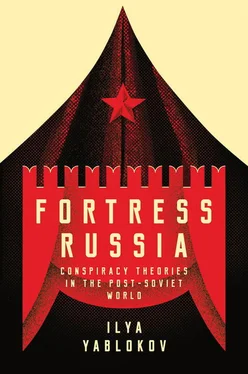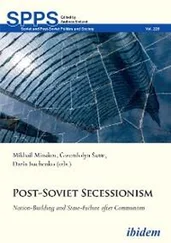Smith, K. (2002). Mythmaking in the New Russia: politics and memory during the Yeltsin era . Ithaca: Cornell University Press.
Smolchenko, A. (2007). Putting Words in Albright’s Mouth. [online] The Moscow Times. Available at: http://www.themoscowtimes.com/news/article/putting-words-in-albrights-mouth/193094.html.
Snyder, T. (2015). Integration amd Disintegration: Europe, Ukraine and the World. Slavic Review , 74(4): 695–707.
Soldatov, A. and Borogan, I. (2015) The Red Web: The Struggle between Russia’s Digital Dictators and the New Online Revolutionaries . New York: Public Affairs.
Sperling, V. (2015). Sex, Politics, and Putin: political legitimacy in Russia . Oxford: Oxford University Press.
Spillius, A. (2011). Vladimir Putin calls John McCain ‘nuts’ in outspoken attack. [online] Telegraph. Available at: http://www.telegraph.co.uk/news/worldnews/europe/russia/8958294/Vladimir-Putin-calls-John-McCain-nuts-in-outspoken-attack.html.
Stal, M. (2013). Psychopathology of Joseph Stalin. Psychology , 4, 1–4.
Staryi televizor (2012). Interv’iu Andreia Loshaka, pridumavshego proekt ‘Rossiia: Polnoe zatmenie’. Avtor podrobno rasskazal zachem i kak vse snimalos’ . [online] Available at: http://staroetv.su/news/2012-09-01-1866.
Stott, M. (2007). Putin appeals for Russian voters, opponents criticise. [online] Available at: http://www.reuters.com/article/us-russia-vote-idUSL2946083720071129.
Suny, R. G. (1993). The Revenge of the Past. Nationalism, Revolution and the Collapse of the Soviet Union . Stanford: Stanford University Press.
Tolz, V. (1998). Forging the Nation: National Identity and Nation Building in Post-Communist Russia. Europe-Asia Studies, 50(6): 993–1022.
—— (2001). Russia. London: Arnold.
—— (2014). Modern Russian Memory of the Great War, 1914–1920. In E. Lohr, A. Semyonov and V. Tolz, eds. Nation and Empire at War . Bloomington: Slavica Press, pp. 257–86.
Topping, A. and Elder, M. (2012). Britain admits ‘fake rock’ plot to spy on Russians. [online] Guardian . Available at: https://www.theguardian.com/world/2012/jan/19/fake-rock-plot-spy-russians.
Toynbee, A. J. (1947). Russia’s Byzantine Heritage. In Connoly, C., ed. Horizon XVI (91): 82–95.
Treisman, D. (2007). Putin’s Silovarchs. Orbis , 51 (1): 141–53.
—— (2011). The Return: Russia’s Journey from Gorbachev to Medvedev. New York: Free Press.
—— (2013). Can Putin Keep His Grip on Power? Current History , (10): 251– 8.
Trenin, D. (2011). Overview of the History of Russian Foreign Policy, (1992– 2010). In Bubnova, N., ed., 20 Years Without the Berlin Wall: A Breakthrough to Freedom. Moscow: ROSSPEN.
Tsygankov, A. (2009). Russophobia. Anti-Russian Lobby and American Foreign Policy. New York: Palgrave Macmillan.
Turkova, K. (2013). ‘Levada tsentru’ zakazyvaiut issledovaniia s tsel’iu vneshnego upravleniia nashei stranoi’. [online] Kommersant FM. Available at: http://kommersant.ru/doc/2185439/print.
Utekhin, I. (2004). Ocherki kommunal’nogo byta . Moscow: Novoe literaturnoe obozrenie.
Umland, A. (2007). Post-Soviet ‘Uncivil Society’ and the Rise of Aleksandr Dugin: A Case Study of the Extraparliamentary Radical Right in Contemporary Russia. PhD. Cambridge University.
—— (2009). Patologicheskie tendentsii v russkom ‘neoevraziistve’. O znachenii vzleta Aleksandra Dugina dlia interpretatsii obshchestvennoi zhizni sovremennoi Rossii. Forum noveishei vostochnoevropeiskoi istorii i kul’tury (2): 127–41.
—— (2010). Aleksandr Dugin’s transformation from a lunatic fringe figure into a mainstream political publicist, 1980–1998: A case study in the rise of late and post-Soviet Russian fascism. Journal of Eurasian Studies, 1: 144–152.
—— (2011). Fascist Tendencies in Russian Higher Education: The Rise of Aleksandr Dugin and the Faculty of Sociology of Moscow State University. Democratizatsiya, [online] Available at: link.
Vanhala-Aniszewski, M. and Siilin, L. (2013). The Representation of Mikhail Gorbachev in the Twenty-First Century Russian Media. Europe-Asia Studies , 65 (2): 221–43.
Vasil’ev, I. (2007). Vot stoit ona pered nami. [online] Ogonek. Available at: https://www.kommersant.ru/doc/2299668.
Vedomosti. (2016). ‘Levada-tsentr’: 56% rossiian sozhaleiut o raspade SSSR. [online] Available at: https://www.vedomosti.ru/politics/news/2016/12/05/668109-levada-tsentr-sssr.
Verkhovsky, A. (2016). Radical nationalists from the start of Medvedev’s presidency to the war in Donbas: True till Death? in Kolsto P. and Blakkisrud, H., ed., The New Russian Nationalism: Imperialism, Ethnicity and Authoritarianism , 2000–2015 , Edinburgh: Edinburgh University Press, pp. 75–103.
Viderker, S. (2010). ‘Kontinent Evraziia’: klassicheskoe evraziistvo i geopolitika v izlozhenii Aleksandra Dugina. Forum noveishei vostochnoevropeiskoi istorii i kul’tury , (1): 5–14.
Volkov, V. (2008). Standard Oil and Yukos in the Context of Early Capitalism in the United States and Russia. Demokratizasiya , 16 (3): 240–64.
—— (2012). Protestnye mitingi v Rossii kontsa 2011-nachala 2012 gg.: zapros na demokratizatsiiu politicheskikh institutov. Vestnik obshchestvennogo mneniia (2): 73–86.
—— (2015). 86% Putina: verit’ ili net? [online] Vedomosti. Available at: http://www.vedomosti.ru/opinion/articles/2015/12/09/620191-86-putina.
—— (2016). Russian Elite Opinion After the Crimea. [online] Carnegie endowment for international piece. Available at: http://carnegieendowment.org/files/CP_Volkov_WEB_Eng.pdf.
Volkov, D. and Goncharov, S. (2014). Rossiiskii media-landshaft: televidenie, pressa, internet. [online] Levada-tsentr. Available at http://www.levada.ru/2014/06/17/rossijskij-media-landshaft-televidenie-pressa-internet/.
von Bieberstein, J. R. (2008). Der Mythos von der Verschwörung: Philosophen, Freimaurer, Juden, Liberale und Sozialisten als Verschwörer gegen die Sozialordnung. Marix Verlag.
Voronin, N. (2013). Surkov rasskazal v Londone, chto mechtaet o zastoe. [online] BBC Russian. Available at: http://www.bbc.com/russian/russia/2013/05/130501_surkov_lse_russia_lecture.shtml.
Weaver, C. (2012). Unorthodox behaviour rattles Russian church . [online] Financial Times. Available at: http://www.ft.com/intl/cms/s/0/8da92478-8573-11e1-a75a-00144feab49a.html#axzz1sErQuxqp.
Weir, F. (2005). Russian government sets sights on ‘subversion’ . [online] The Christian Science Monitor. Available at: http://www.csmonitor.com/2005/0601/p06s02-woeu.html/(page)/2.
White, S. (2011). Understanding Russian Politics . Cambridge: Cambridge University Press.
Wikileaks. (2010). Cable 10Moscow184: The Evolving Role and Influence of Vladislav Surkov . [online] Available at: http://wikileaks.org/cable/2010/01/10MOSCOW184.html.
Wilson, A. (2005). Virtual Politics: Faking Democracy in the Post-Soviet World. New Haven: Yale University Press.
—— (2014). Ukraine Crisis: What it Means for the West? New Haven: Yale University Press.
Yablokov, I. (2014). Pussy Riot as Agent Provocateur: Conspiracy Theories and the Media Construction of Nation in Putin’s Russia. Nationalities Papers , 42 (4): 622–-36.
—— (2015). Conspiracy Theories as Russia’s Public Diplomacy Tool: The Case of ‘Russia Today’ (RT). Politics, 35 (3–4): 301–15.
Yanov, A. (2010). Istoriia odnogo otrecheniia: pochemu v Rossii ne budet fashizma. Forum noveishei vostochnoevropeiskoi istorii i kul’tury (2): 187–214.
Читать дальше
Конец ознакомительного отрывка
Купить книгу












